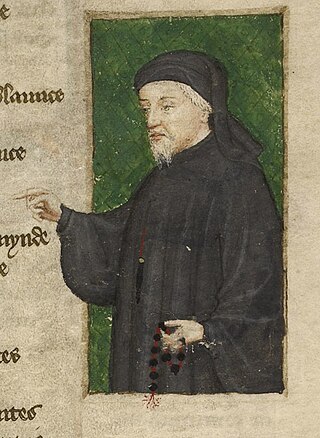
Geoffrey Chaucer was an English poet, author, and civil servant best known for The Canterbury Tales. He has been called the "father of English literature", or, alternatively, the "father of English poetry". He was the first writer to be buried in what has since come to be called Poets' Corner, in Westminster Abbey. Chaucer also gained fame as a philosopher and astronomer, composing the scientific A Treatise on the Astrolabe for his 10-year-old son Lewis. He maintained a career in the civil service as a bureaucrat, courtier, diplomat, and member of parliament.

Edward Williams Morley was an American scientist known for his precise and accurate measurement of the atomic weight of oxygen, and for the Michelson–Morley experiment.

Walter William Skeat, was a British philologist and Anglican deacon. The pre-eminent British philologist of his time, he was instrumental in developing the English language as a higher education subject in the United Kingdom.

Dean Frederic William Farrar was a senior-ranking cleric of the Church of England (Anglican), schoolteacher and author. He was a pallbearer at the funeral of Charles Darwin in 1882. He was a member of the Cambridge Apostles secret society. He was the Archdeacon of Westminster from 1883 to 1894, and Dean of Canterbury from 1895 until his death in 1903.

Charles Kendall Adams was an American educator and historian. He served as the second president of Cornell University from 1885 until 1892, and as president of the University of Wisconsin from 1892 until 1901. At Cornell he established a new law school, built a library, and appointed eminent research professors for the Ivy League school. At Wisconsin, he negotiated ever-increasing appropriations from the state legislature, especially for new buildings such as the library. He was the editor-in-chief of Johnson's Universal Cyclopaedia (1892–1895), and of the successor Universal Cyclopaedia (1900), sometimes referred to as Appleton's Universal Cyclopaedia.

Hiram Corson was an American professor of literature.

Bliss Perry, was an American literary critic, writer, editor, and teacher.

George Lyman Kittredge was a professor of English literature at Harvard University. His scholarly edition of the works of William Shakespeare was influential in the early 20th century. He was also involved in American folklore studies and was instrumental in the formation and management of the Harvard University Press. One of his better-known books concerned witchcraft in England and New England.

Emerson Hough was an American writer best known for writing western stories and historical novels. His early works included Singing Mouse Stories and Story of the Cowboy. He was well known for his 1902 historical novel The Mississippi Bubble. Many of his works have been adapted into films and serial films.

Thomas Raynesford Lounsbury was an American literary historian and critic. He was born in Ovid, New York on January 1, 1838. He graduated from Yale College in 1859 with a B.A. and received a M.A. from Yale University in 1887. He later received honorary degrees from Yale University, Harvard University, Lafayette College, Princeton University, and Aberdeen College. He enlisted in the 126th New York Volunteers in 1862 and served in the Civil War as a first lieutenant.
Frank Jewett Mather Jr. was an American art critic and professor. He was the first "modernist" professor at the Department of Art and Archaeology, Princeton University. He was a direct descendant of Richard Mather a Puritan minister in 17th century Boston.

Sir Ernest Barker was an English political scientist who served as Principal of King's College London from 1920 to 1927.
William Henry Schofield (1870–1920) was an American academic, founder of the Harvard Studies in Comparative Literature. He was professor of comparative literature at Harvard University, and president of the American-Scandinavian Foundation (1916–1919).

Stuart Pratt Sherman was an American literary critic, educator and journalist known for his philosophical "feud" with H. L. Mencken. The two men were very close in age, and their career paths have sometimes been compared, but Mencken outlived Sherman by three decades.

Walter Bowers Pillsbury was an American psychologist, born at Burlington, Iowa. He studied for two years at Penn College, Oskaloosa, Iowa, graduated from the University of Nebraska (1892), and subsequently completed a Ph.D. at Cornell University (1896). Pillsbury taught at the University of Michigan after 1897, in 1905–1910 as junior professor of philosophy and director of the psychological laboratory and afterward as professor of psychology. In 1908–1909 he lectured at Columbia. He served as president of the Western Philosophical Association in 1907 and of the American Psychological Association in 1910. Besides contributing to the American Journal of Psychology and to The Philosophical Review, he translated, with Edward B. Titchener, Külpe's Introduction to Philosophy (1897) and published:

Henry Carter Adams was a U.S. economist and Professor of Political Economy and finance at the University of Michigan.

Contact between Geoffrey Chaucer and the Italian humanists Petrarch or Boccaccio has been proposed by scholars for centuries. More recent scholarship tends to discount these earlier speculations because of lack of evidence. As Leonard Koff remarks, the story of their meeting is "a 'tydying' worthy of Chaucer himself".
Richard J. Utz is a German-born medievalist who has spent much of his career in North America. He specializes in medieval studies, and served as president of the International Society for the Study of Medievalism (2009–2020).
Henry Ansgar Kelly is distinguished research professor of English at the University of California, Los Angeles.
Charles William Kent (1860-1917) was an American scholar, who taught at the University of Virginia and the University of Tennessee. He edited a number of collections of poetry, including poetry from the American South, as well as the Old English poem Elene.














